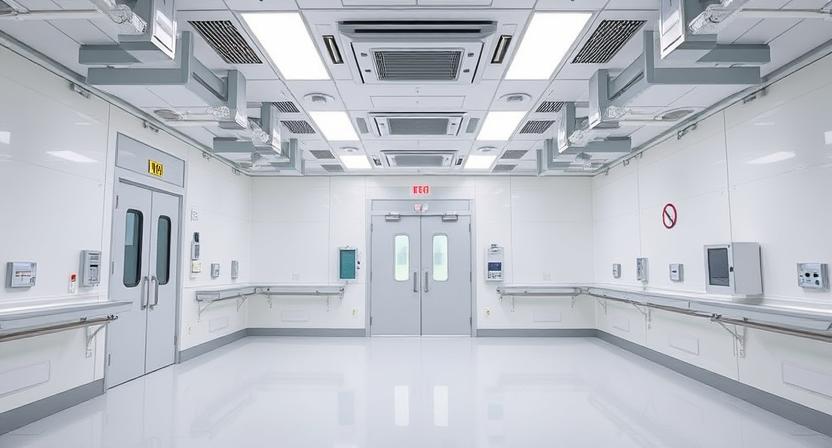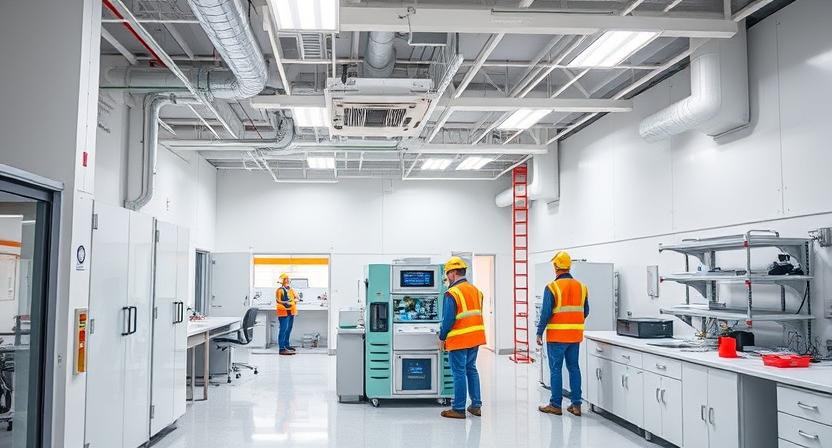Why Life Sciences General Contractors Are Critical to Building Advanced Research Facilities
The requirement for highly specialised construction is growing along with the life sciences sector. In order to provide facilities that are compliant, operational, and future-ready, life sciences general contractors are crucial, whether they are building biotech labs, pharmaceutical cleanrooms, or research centres. These contractors translate intricate ideas into practical realities and are aware of the particular operational, environmental, and legal requirements of scientific settings.
What Makes Life Sciences Construction So Specialized?
Life sciences facilities must adhere to stringent norms, regulations, and workflow efficiency criteria, which set them apart from ordinary commercial buildings. They need to create a comprehensive of:
- Contamination control and cleanroom requirements
- Compliance with GMPs (Good Manufacturing Practices)
- Zoning for HVAC and air pressure
- specialised plumbing, electrical, and mechanical (MEP) systems
Due to these factors, only seasoned general contractors in the life sciences can guarantee that projects are finished on schedule, within budget, and in complete compliance with regulatory standards like ISO, USP, and FDA.
Step-by-Step: How Life Sciences General Contractors Deliver Quality Projects
Step 1: Pre-Construction Planning
Understanding the client’s operating requirements and potential scalability is the first step. To create a thorough scope of work, contractors work with engineers, architects, and compliance consultants. This phase frequently consists of:
- Analysis of site viability
- Forecasting the budget and timeline
- Evaluation of risks
- A plan for regulatory compliance
Step 2: Design-Build Collaboration
For greater efficiency, life sciences contractors frequently employ design-build techniques as opposed to conventional bid-build approaches. This makes it possible for stakeholders to communicate together, which leads to:
- Reduced change orders and delays
- smooth transition from design to construction
- Space planning that is optimised for lab workflow
Step 3: Construction and Quality Control
Strict attention to timetables and quality control protocols precedes construction. Important areas of attention include:
- Installing cleanrooms with high-performance HVAC
- Verifying that every material complies with FDA or ISO standards
- Checkpoints for real-time inspections
If working in an existing facility, skilled general contractors in the bio sciences also guarantee minimal interruption.
Step 4: Commissioning and Validation
Comprehensive commissioning and validation are carried out prior to handover. This comprises:
- Testing and balancing of equipment
- Observation of the environment
- Reporting on documentation and compliance
- Training and client walkthrough
These last actions ensure that the facility is completely functional and prepared for examinations.

Why Choose a Specialized Contractor?
Employing a company with no life sciences background may lead to ineffective designs, expensive delays, and regulatory problems. Expert contractors provide:
- extensive knowledge of the industry
- Availability of approved suppliers and resources
- Current knowledge of compliance issues
- Proven techniques for project management
A successful build and a calculated investment in your future production or research capacities are guaranteed when you work with the right life sciences general contractors.
Additional Considerations for Life Sciences Construction
Integrating Sustainability Into Scientific Spaces
When building labs, sustainability is becoming more and more important. These days, life sciences general contractors help clients lessen their environmental impact without sacrificing functionality or compliance by using LEED certification planning, energy-efficient HVAC systems, and green materials.
Managing Contamination Risks in Design and Build
Contamination control is a significant priority in the creation of life sciences. Expert life sciences general contractors make sure that every component, from airflow systems to antimicrobial surfaces, is made to avoid cross-contamination and satisfy biosafety standards for crucial production and research areas.
Modular and Scalable Facility Solutions
For rapidly expanding biotech or pharmaceutical companies, scalability is essential. Modular construction methods are frequently used by life sciences general contractors, enabling lab expansion or reconfiguration with little disturbance. This forward-thinking strategy supports changing scientific workflows and delivers long-term benefit.
Common Mistakes to Avoid in Life Sciences Facility Projects
Underestimating Compliance and Regulatory Needs
Lab builds are often treated like regular commercial projects, which is a mistake made by many engineers. Without the knowledge of general contractors in the life sciences, facilities would have to undergo expensive redesigns in order to comply with FDA, USP 800, or GMP regulations, which would delay operations and increase the risk of fines.
Poor Workflow and Layout Planning
The layout of a lab has a big impact on how productive it is. Research or production delays may result from insufficient space design. Stakeholders and knowledgeable building contractors in the life sciences work together to streamline operations, eliminate equipment bottlenecks, and guarantee seamless staff mobility across the building.
Overlooking Long-Term Maintenance Factors
Clients may eventually have to deal with costly shutdowns if maintenance access and upgrades are not taken into account early. Expert general contractors in the life sciences take future maintenance requirements into consideration when designing your systems, guaranteeing their continued usability and effectiveness.

How to Choose the Right Life Sciences General Contractor
Look for Industry-Specific Portfolio and References
The top general contractors in the life sciences will have a track record of successfully completing biotech, pharmaceutical, or laboratory projects. To make sure you’re selecting a qualified partner, ask for references, case studies, and images that demonstrate comparable scopes of work.
Evaluate Their Understanding of Regulatory Frameworks
It’s critical that your contractor is aware of the regulatory agencies that are pertinent to your industry. A capable company will be knowledgeable about FDA, USP, ISO, and CDC standards, guaranteeing that your facility satisfies all codes and audit requirements right away.
Prioritize Communication and Transparency
Regular communication is essential for productive teamwork. Select a life sciences general contractor who offers prompt problem solving, clear reporting, and updated project milestones. Maintaining budgets and schedules requires this degree of expertise.
